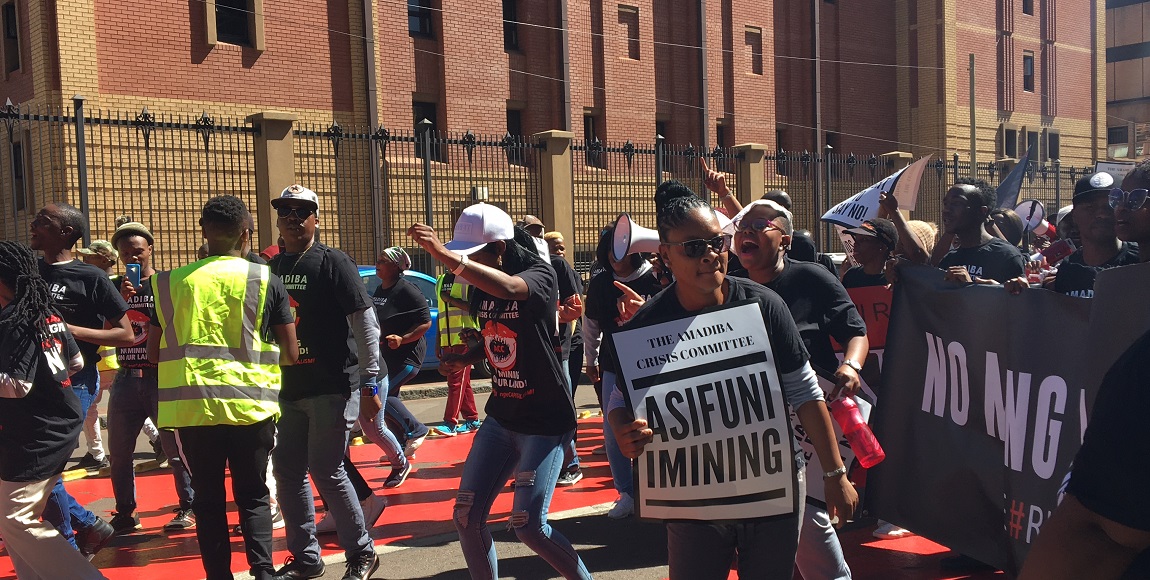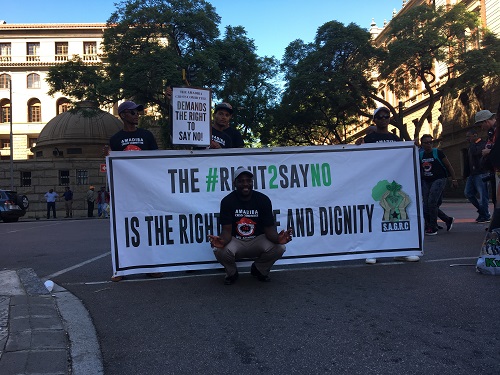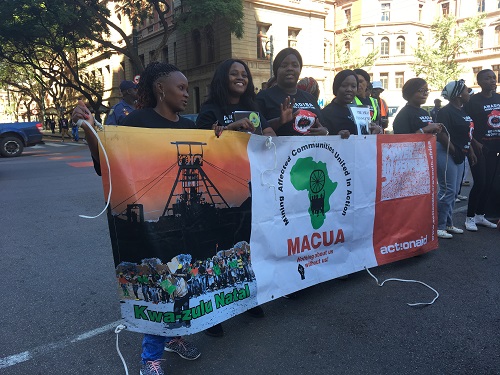Tuesday, 24 April marked the second day of the court proceedings between the Amadiba Crisis Committee (ACC), the department of mineral resources (DRM), and Australian mining conglomerate Transworld Energy and Minerals (TEM). The ACC, who are representing the Xolobeni farming community, are arguing that the community should have the right to decide how their land is used. Several hundred people gathered outside the court to show their support for the community and the #Right2SayNo campaign. The Daily Vox team was there.
Different mining affected communities from KwaZulu-Natal, North West, Mpumalanga, Limpopo, and Northern Cape gathered outside the court to show their support and solidarity for the ACC and the Xolobeni community. Inside the Pretoria High Court, the ACC, represented by lawyers from Richard Spoor Inc and the Legal Resources Centre (LRC) ,were arguing against the government’s plans to issue a mining license to the Australian company.
The Xolobeni Community Is Fighting For A Voice In Mining Decisions
The three day case which started on Monday 23 April would end on Wednesday 25 April. Keamogetswe Seipato from the Alternative Information Development Centre (AIDC) told The Daily Vox: “I stand to be corrected of course but I believe this is going to be an ongoing process. But I think the judge will have between three to six months to comment. After three to six months, she will let us know her judgement.”
Seipato said if things don’t go their way they will take this further all the way to the Constitutional Court.
There were plans for several members of the crowd to head to the DMR to hand over a memorandum of demands as well as postcards. The postcards are a part of a series of photos compiled by Thom Pierce which features the words of the community with regards to what their land means to them and why they are saying no to any mining activity.
Adelaide Mokwena, an activist from Middelburg, said she had joined the solidarity action because land is an important resource. “Our grannies have the land but they don’t get the water. We want them to find place for our people. They have to win the case because we don’t want to struggle.”
Cromwell Monwabisi, a member of the Xolobeni community said: “We are here as the voice of the community so that we can fight for what is ours. Our land will always be our land and that is why we are here as the voice of the community. We demand our rights.”
Monwabisi said this case is important because there is another generation coming who they have to pave the way for so they can have the land. “It will be very important to [win this case] because it is what drive us from Eastern Cape to Pretoria. For us to be there, it shows us how important it is for us to have the right to say no. It will be very exciting as a community to win the case. If they grant us our right back, it will be very important,” added Monwabisi.
As for what it will mean for other communities, he said the Xolobeni community can be an example for them to say they fought for their rights and got them back.
Monwabisi says even if people aren’t physically supporting the cause, they can support in spirit. “The land is very important to a human. Land is our right. Everybody has a right to live and our land is our right,” Monwabisi said.
Francine Nkosi from the Waterberg Women Advocacy Group said this case is important. “As communities they say we own the topsoil and the other soil is owned by the government. We want to change that because as communities there is nothing about us without us. We have the right to say no to that because we want to keep the land for the future generations,” she said.
Duduzile Mkwanazi from the South African Green Development Council was there to support the Xolobeni community because she knows the effects of mines first-hand. “As someone who grew up in the area where there are mines I know the effects of the mines on our communities, so I say no to mining,” she said.
Mkwanazi said that mines usually destroyed the land and this puts a greater burden on women who are forced to take care of their husbands who get sick from working on the mines. She said it will be a victory for all mining communities if the Xolobeni community wins the case.
Another supporter of the community, poet Siboniso Dlamini, said the victory of the Xolobeni community will mean a victory for all communities.
The case continues on Wednesday 25 April.












